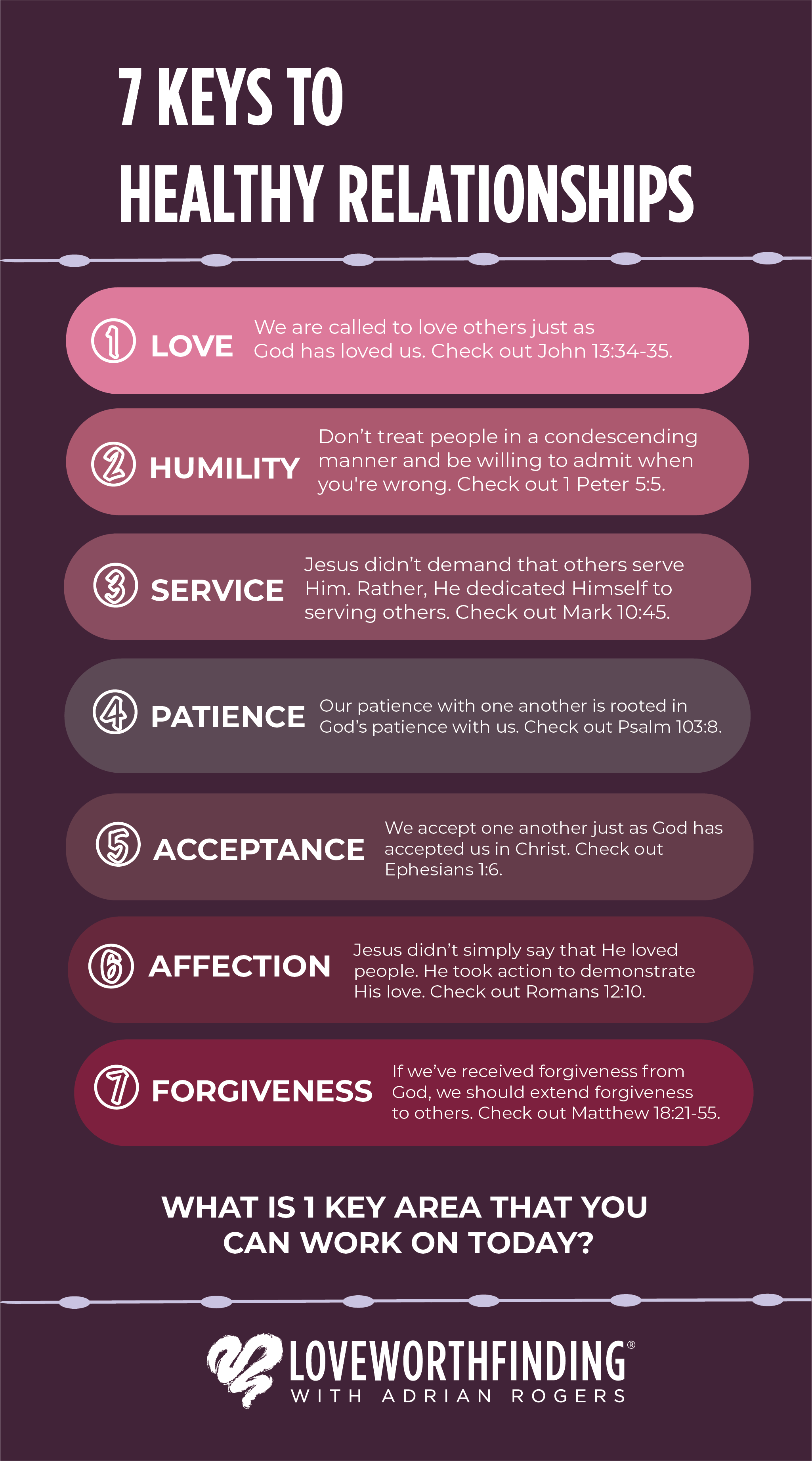8 Warning Signs of Unhealthy Relationships

It's difficult to see warning signs of an unhealthy relationship. Thankfully, God gave us the Bible so we can learn what healthy relationships look like.
Learn MoreWe want to be close to people and to know that they love us. We want to experience friendship, nearness, and intimacy. We want to know and be known.
But how do we get these types of relationships? We’ve all experienced the many challenges and difficulties that come with any relationship: disagreements, differences, misunderstandings, offenses, and much more. How can we work through these issues in a helpful and healthy manner?
Many of us were never taught how to have healthy relationships. What’s more, many of us didn’t grow up in a home where solid relationships were modeled.
Thankfully, God’s word shows us what relationships should look like. It gives us guidance on how to connect with others in ways that are a blessing to us and honor God.
In this article, we’re going to take a close look at the Biblical keys to healthy relationships.
Ready? Let’s dive in.

Depending on your experience, you may wonder if healthy relationships are even possible. There’s a lot of brokenness in the world. Are good, solid, joy-filled relationships even possible?
Yes. The Bible makes that very clear. When God created Adam and Eve, His intent was for them to have a wonderful, God-honoring relationship.

Sin, however, created a rift between Adam and Eve, damaging the sweet fellowship God had given them. Since then, every relationship has been marred by sin.
The good news is that Jesus Christ came to bring healing to our relationships. First and foremost, Jesus restored us to God through His sacrificial death on the cross. Through Christ, all our sins are forgiven and we can call God “Father”.
Jesus also restores our relationships with one another. He gives us supernatural power to love one another and treat each other with dignity and respect.
When the Bible was written, there was deep enmity between Jews and Gentiles (non-Jews). Through His death and resurrection, Jesus broke down the wall that divided them.
In Ephesians 2:14-15, we read:
For He Himself is our peace, who has made both one, and has broken down the middle wall of separation, having abolished in His flesh the enmity, that is, the law of commandments contained in ordinances, so as to create in Himself one new man from the two, thus making peace.
Now, any person who believes in Christ has access to God. Anyone who puts their hope in Jesus has their sins forgiven and is given innumerable blessings. In Jesus we are all equal.
Part of being a Christian is pursuing healthy relationships. Jesus is our model for healthy relationships and we are called to be like Him. Our relationships certainly won’t be perfect. We will still have struggles and sin against each other. But with God’s help, we truly can have good relationships.
So what do healthy relationships look like? What does the Bible have to say about how we should treat one another? Here are 7 keys to healthy relationships.

More than anything else, solid relationships are characterized by love. In fact, love is supposed to be one the defining characteristics of us who are Christians.
In John 13:34-35, Jesus said to His disciples:
A new commandment I give to you, that you love one another; as I have loved you, that you also love one another. By this all will know that you are My disciples, if you have love for one another.
The best relationships are those that are filled with Christian love. God has demonstrated His profound love for us by sending Jesus to save us. We are called to love others just as God has loved us.
Christian love is much more than a feeling. It is a sturdy love that perseveres through thick and thin. It is a sacrificial, giving love. When our relationships are governed by love, everything else falls into place.
1 Peter 4:8 says,
“And above all things have fervent love for one another, for ‘love will cover a multitude of sins.’”
When we operate out of love, we are able to work through struggles and difficulties. We can forgive and extend mercy toward one another.
As we talk about other characteristics of healthy relationships, it’s important to remember that all of them flow out of love. You can’t be patient, accepting, or affectionate toward a person if you don’t first love them.
If you want your relationships to be stronger, start to pray that they would be filled with love. As you grow in modeling Christ-like love, you’ll start to see your relationships be transformed.
Agape love is one of four specific kinds of love described in the Bible. It changes the way we understand God and transforms our relationships with others.
Humility is the second key to healthy relationships. When we’re humble, we’re willing to listen to the opinions and ideas of others. We don’t treat people in a condescending manner and are willing to admit when we’re wrong.
1 Peter 5:5 says:
"Yes, all of you be submissive to one another, and be clothed with humility, for “God resists the proud, but gives grace to the humble.”

Humility doesn’t mean you have low self-esteem or think of yourself as a loser. It simply means thinking rightly about yourself. Humility causes us to realize that we’re just like everyone else. We don’t understand everything and we’re prone to making mistakes. We don’t always see everything clearly and can learn from others.
Romans 12:3 says,
“For I say, through the grace given to me, to everyone who is among you, not to think of himself more highly than he ought to think, but to think soberly, as God has dealt to each one a measure of faith.”
When we’re humble, we think rightly about ourselves. We recognize the gifts God has given us without elevating ourselves over others.
Why should we be humble? Because God pours out His grace on the humble. He stands against those who are proud but bestows great blessings on the humble.
If you want to see growth in your relationships, begin to ask God to help you grow in humility. Ask Him to help you value others and not think too highly of yourself.

Service is the third key to healthy relationships. Jesus Himself is our model of service. When He came to earth, He didn’t demand that others serve Him. Rather, He dedicated Himself to serving others.
Mark 10:45 says,
“For even the Son of Man did not come to be served, but to serve, and to give His life a ransom for many.”
This is an incredible passage. Even though Jesus was the Son of God and King of Kings, He came as a servant. He spent His time healing the sick and blessing the poor. He washed the feet of His disciples. He sacrificed His life on the cross to save us from our sins. Never has the world seen such humility.
The world believes that the way to greatness is to claw your way to the top and step over anyone who gets in your way. Jesus said the opposite is true. The way up is to go low.
In Matthew 20:25-26, Jesus said,
“You know that the rulers of the Gentiles lord it over them, and those who are great exercise authority over them. Yet it shall not be so among you; but whoever desires to become great among you, let him be your servant.”
The best relationships are those where each person seeks to serve the other. Instead of fighting to get their own way, each person looks first to the interests and desires of the other.
Ask the Lord to help you grow in service. Ask Him for the grace to put others ahead of yourself.
God created us both to love and to be loved. Let's look at each of the five types of love languages, compare them to Scripture, and seek to apply them.

The fourth key to healthy relationships is patience. The reality is that every person makes mistakes. We all have our own struggles and difficulties. If we want to have deep, meaningful relationships, we absolutely must be patient with one another.
Our patience with one another is rooted in God’s patience toward us. He doesn’t treat us as our sins deserve. He is patient as we slowly grow in righteousness.
Sometimes it takes us years to make progress in a particular area. Yet God doesn’t hold that over us. He is lovingly beside us each step of the way.
Psalm 103:8 says,
“The Lord is merciful and gracious, slow to anger, and abounding in mercy.”
If God is so patient with us, we must be patient with others. We don’t demand that they change immediately. We don’t have a “my way or the highway” mentality. When conflict arises, we patiently work through it.
Ask God to help you grow in patience. Ask Him to help you constantly remember His patience with you. As you become more patient, your relationships will be strengthened.
It can be tough to know who your true friends really are. When we look at what the Bible has to say, we learn what friendship really looks like.
The fifth key to healthy relationships is acceptance. Now, to be clear, acceptance doesn’t mean saying that everything is good and okay. It does mean that we warmly welcome one another.
We don’t create “in” groups that exclude certain people. Rather, we accept one another just as God has accepted us in Christ.

Ephesians 1:6 says that we are “accepted in the Beloved”. God has forgiven all our sins, adopted us as children, and accepted us into His family. We are no longer excluded from the presence of God. We can come freely and boldly, knowing that God loves us and delights in us.
We should never make people feel like they have to earn our love or friendship. God welcomes us with open arms. We don’t have to work for His love or welcome. He gives it freely to us in Christ. He doesn’t show favoritism and neither should we.
If you struggle to welcome others, ask God to give you His heart.
God’s word is the best place to find relational advice. Let’s look at these Bible verses for friendship to see how we too can better love our friends.

The sixth key to healthy relationships is affection.
Affection is a visible demonstration of love, and it can take all sorts of forms. Giving gifts, hugging, serving, and making a meal are all forms of affection.
They are tangible ways of showing a person that you truly do love them.
Think of all the ways that Jesus showed affection to people:
Jesus didn’t simply say that He loved people. He took action to demonstrate His love.
If Jesus was affectionate, we should be too. We should do all that we can to show people just how much we care about them.
Romans 12:10 furthers this point when it says,
“Be kindly affectionate to one another with brotherly love, in honor giving preference to one another.”
Affection and love go hand-in-hand. Affection is proof that we really love someone.
Be creative in the ways you show affection. Think about the things a person values most. Do they love physical affection? Gifts? Quality time together Acts of service? Make it your goal to show affection to people in ways that they find meaningful.
The more affectionate you are, the stronger your relationships will be. If you’re not naturally an affectionate person, ask the Lord to help you. He can give you the power to be affectionate even if you don’t normally feel that way.
The Greeks found four different types of love. Let's look at the 4 different types of love present in the Bible as well as examples of each type.
Forgiveness is the seventh key to healthy relationships and should be a hallmark of every Christian.
We’ve had all our sins - every single one - forgiven by God. That forgiveness was secured for us by the precious blood of Jesus. It cost God an enormous amount to forgive us.
If we’ve received such extravagant forgiveness from God, we should extend forgiveness to others.

In Matthew 18:21-35, Jesus told a parable about a man who owed an enormous debt to the king. Unable to pay the debt, the man went to the king and pleaded with him for forgiveness. Because the king was merciful and compassionate, he completely forgave the man’s debt.
The man went out and another man who owed him a much smaller debt. He demanded that the debt be paid and had the man thrown in prison until the debt could be paid. When the king heard of this, he was outraged. Hadn’t he just forgiven an absolutely enormous debt? The king threw the first man into prison and refused to release him until the debt was paid.
This parable illustrates how important forgiveness is. God has forgiven our enormous, unpayable debt. In light of this, we are called to extend the same gracious forgiveness to others.
When we refuse to forgive, bitterness is the result. We hold grudges, refusing to be gracious to those who have wronged us. This is deeply hurtful to God and destroys relationships. There’s an old saying that holding a grudge is like drinking rat poison and expecting the rat to die. Unforgiveness is a terrible poison that eats away at us and destroys relationships.
Forgiveness can be a very difficult thing if you’ve been deeply hurt by someone. It doesn’t happen overnight. But God can help you move toward forgiveness. He can give you the power to let go of your grudges and extend forgiveness. As Jesus was being nailed to the cross, He asked God to forgive the soldiers. Jesus can give you that same power in your own life.
God’s word contains timeless principles regarding relationships, and these principles apply directly to dating. Let's seek to apply this dating “advice” to our lives.
It’s true that healthy relationships take work. It takes work to resolve disagreements and extend forgiveness. It takes thought and effort to show affection. It can be a real struggle to serve others.
But relationships are worth the work and struggle. There are few things more precious than having a close, strong relationship that can survive the bumps of life.
Ecclesiastes 4:9-10 says:
Two are better than one,
Because they have a good reward for their labor.
For if they fall, one will lift up his companion.
But woe to him who is alone when he falls,
For he has no one to help him up.
A close friend is a valuable treasure. You can pick each other up when you fall. You can encourage each other when you’re discouraged. You can help each other grow in Godliness and love for God.
If you don’t have any close relationships, ask the Lord to bring someone into your life. God doesn’t want you to walk through life alone. Life is too difficult to navigate by yourself.
You can be confident that the Lord will answer your prayers.

It's difficult to see warning signs of an unhealthy relationship. Thankfully, God gave us the Bible so we can learn what healthy relationships look like.
Learn More
It can be tough to know who your true friends really are. When we look at what the Bible has to say, we learn what friendship really looks like.
Learn More
Agape love is one of four specific kinds of love described in the Bible. It changes the way we understand God and transforms our relationships with others.
Learn More